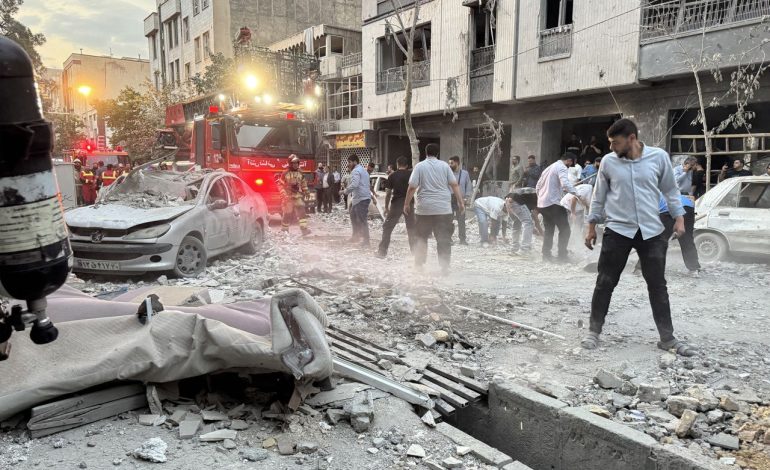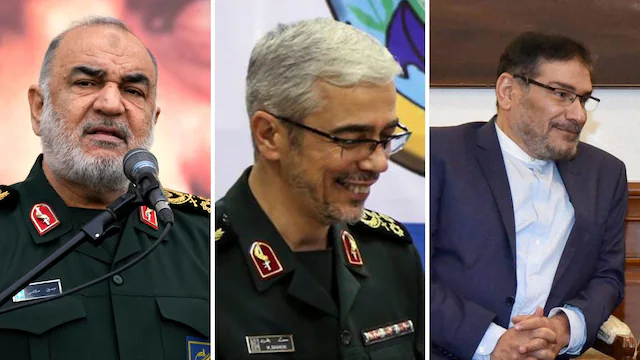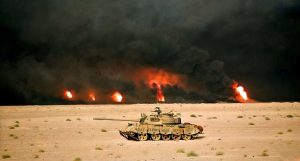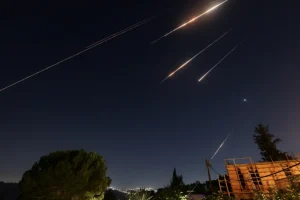EXCLUSIVE: Israel-Iran War on the Horizon? Operation Rising Lion and Retaliatory Strikes.

In the early hours of June 13, 2025, Israel launched a wide-scale military campaign against Iran under the code name Operation Rising Lion, striking a range of strategic sites across the country.
The operation marks a major escalation in the long-running tensions between the two nations and comes after months of growing alarm over Iran’s nuclear program.
According to Israeli and international sources, the strikes involved over 200 Israeli aircraft and precision-guided munitions, supplemented by drone attacks and alleged sabotage carried out by Mossad operatives. Targeted sites included Iran’s nuclear enrichment facility at Natanz, missile production facilities, air defense installations, and key military complexes. Some residential areas believed to house high-ranking Iranian officials were also hit.

Initial reports suggest the deaths of at least 20 senior Iranian officials, including Major General Mohammad Bagheri, Chief of Staff of the Iranian Armed Forces; Major General Hossein Salami, Commander-in-Chief of the Islamic Revolutionary Guard Corps; and Brigadier General Amir Ali Hajizadeh, head of the IRGC Aerospace Force. Several nuclear scientists involved in Iran’s atomic program are also reported among the casualties. While the exact toll remains unverified, the strikes are being described as one of Israel’s most extensive attacks on Iranian soil.
Prime Minister Benjamin Netanyahu defended the operation as a critical step to prevent Tehran from acquiring nuclear weapons.
“We will continue as long as necessary to protect our nation,” he declared, calling the mission a “decisive moment.”
While Israel has not disclosed the full scope of its objectives, analysts interpret the operation as designed to seriously degrade Iran’s military and nuclear capabilities.
Iran quickly condemned the attack. Officials in Tehran vowed retaliation, warning that:
“The gates of hell will open.”
Iran’s military was placed on high alert, while Israel activated civil defense measures, including sirens in cities and emergency response protocols.
Tensions rippled across the region. Military activity has surged in Lebanon, Syria, and Iraq—countries where Iranian proxy groups are known to operate.
The international response was swift. The United Nations Security Council convened an emergency meeting at Iran’s request, where member states expressed deep concern over the potential for a wider conflict. The UN Secretary-General called for “maximum diplomacy to prevent further bloodshed.”

US Secretary of State Marco Rubio said the United States was not involved in the operation and warned Iran against retaliating against American personnel or interests. The United Kingdom, Japan, Oman, Saudi Arabia, Indonesia, and Australia joined calls for de-escalation. Brazil, Russia, and Turkey condemned the Israeli attack.
Markets reacted sharply. Brent crude oil prices surged above $78 per barrel amid concerns over the security of oil shipments through the Strait of Hormuz, a vital artery for global energy supply.
Israeli intelligence sources indicated the operation had been in preparation for months. Reports suggest deep-cover agents were deployed in Iran to facilitate sabotage and collect intelligence in advance of the strikes.
Dr. David Mednicoff, Chair of Judaic and Near Eastern Studies at the University of Massachusetts-Amherst, described the attack as “a new escalation of the longstanding Israel-Iran conflict” with unpredictable consequences.
“The Netanyahu government’s major escalation against Iran seems to have been planned for months and launched at this time because of some combination of concern that Iran was again getting close to having a nuclear weapon, the US might once more foster a major diplomatic agreement with Tehran, and Netanyahu’s unpopularity can lead him to gain support by big military actions against Israel’s enemies,” he said.
He added, “Logistically, the Israeli attacks seem successful in the extent of damage inflicted on Iran’s military and, possibly, nuclear capacity. Diplomatically… Israel is likely contributing further to its growing global isolation.”
Despite previously unwavering support for Israel from US administrations, Dr. Mednicoff points at cracks forming in the US-Israel relations:
“The President [Trump] tends to see leaders doing something he doesn’t like as a personal betrayal. Given Trump’s public requests to Netanyahu to refrain from military action and his recent support for a deal with Iran, it’s unclear yet how much Washington will help or accept Israel’s new war, despite the Trump Administration’s strong overall ties to Israel.”
Dr. Mednicoff, however, remains somewhat optimistic: “Most of the world, likely including the US, will seek to de-escalate one of the most potentially devastating conflicts possible in a Middle East that has seen far too many devastating conflicts in recent years.”
Dr. Ian Ralby, a maritime security expert and CEO of I.R. Consilium, voiced concern about the potential for an unpredictable Iranian response.
“Iran has a long history of de-escalating after an escalation… However, they are put in a very bizarre situation now, where the cooler heads, at least the more seasoned heads to make decisions, have all been taken out,” he said. “So we are likely to see more erratic behavior… which is cause for concern”

Dr. Ralby warned that “there is no way that the Iranian sense of national pride can allow for Israel to perpetrate such an enormous preemptive attack without some kind of significant response; a hundred drones that were sent is likely just a placeholder,” emphasizing that the situation remains volatile and could “cause the world serious headache and harm.”
Note: Iran conducted a massive missile strike on Tel Aviv. At least 17 Israeli casualties reported.
He also pointed out the potential future involvement of Iranian proxies:
“The Houthis can play a spoiler to this whole situation and really escalate tensions across the region.”
With both countries signaling readiness for further action, the immediate risk of escalation is high. In the following days, international diplomatic efforts are expected to intensify. Operation Rising Lion may significantly reshape the strategic landscape of the region, influencing nuclear policy, military alliances, and global energy security.
With input from Al Jazeera, CNN, BBC, Reuters, the Associated Press, and the Washington Post.









The latest news in your social feeds
Subscribe to our social media platforms to stay tuned